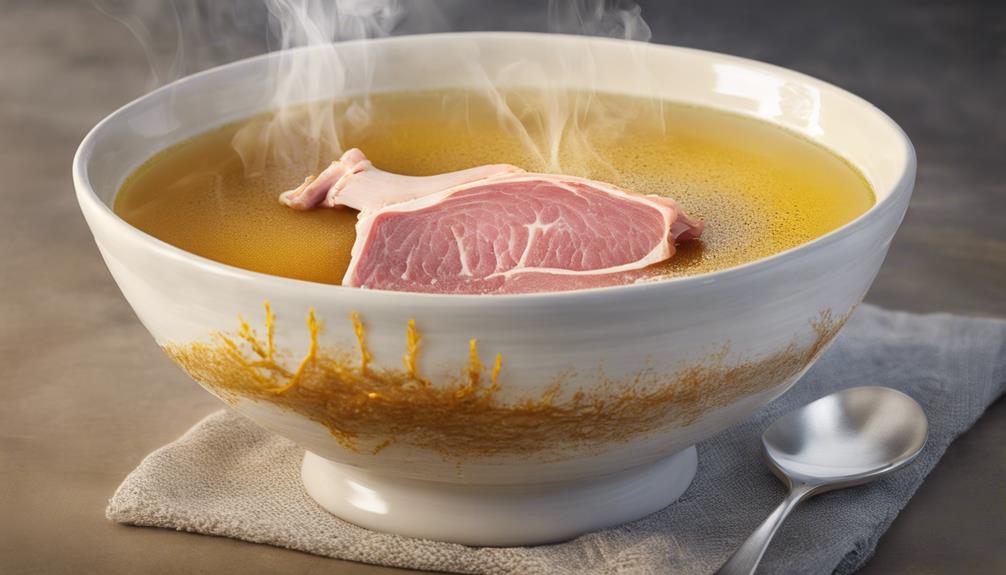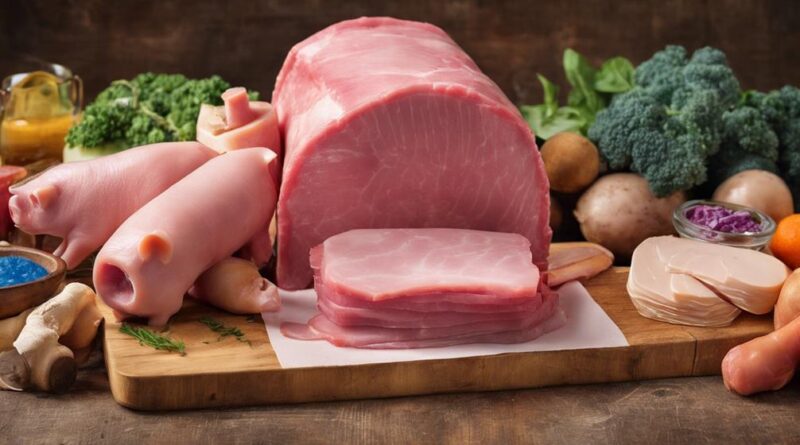7 Best Health Benefits of Pig By-Products
You may not realize it, but pig by-products offer a surprising array of health benefits that could enhance your overall well-being.
From being a rich source of protein to providing essential nutrients like iron and omega-3, these often-overlooked parts of the pig can be a valuable addition to your diet.
As you consider the potential advantages these by-products can offer, it's worth exploring how they could positively impact your health in ways you might not have expected.
Rich Source of Protein
Pig by-products are a rich source of protein, essential for maintaining a healthy diet and supporting muscle growth. When it comes to muscle building, protein is key. Including pig by-products in your diet can provide your body with the necessary amino acids to repair and grow muscle tissue effectively. Whether you're hitting the gym regularly or simply trying to stay active, incorporating protein-rich pig by-products can help you achieve your muscle-building goals.
Moreover, pig by-products can also be beneficial for weight management. Protein is known to be more satiating than carbohydrates or fats, which can help you feel fuller for longer periods. By incorporating pig by-products into your meals, you can aid in controlling your appetite and potentially reducing overall calorie intake. This, coupled with regular exercise, can support your weight management efforts effectively.
To make the most out of pig by-products for muscle building and weight management, consider incorporating lean cuts of pork, such as pork loin or tenderloin, into your meals. Additionally, products like pork skin can be a good source of protein but should be consumed in moderation due to their higher fat content. Remember, balance is key when utilizing pig by-products to support your health and fitness goals.
Nutrient-Dense Offal
When considering nutrient-dense offal, you'll discover a wealth of essential vitamins and minerals packed into these often overlooked pig by-products. These nutrient-packed delicacies aren't only flavorful but also offer a plethora of health benefits. Embark on a culinary exploration and reap the rewards of incorporating offal into your diet.
Here are three reasons why nutrient-dense offal should be a part of your meals:
- Rich in Essential Nutrients: Offal such as liver, kidneys, and heart are brimming with vital nutrients like iron, zinc, vitamin A, and B vitamins. These nutrients are crucial for energy production, immune function, and overall well-being.
- Supports Brain Health: Offal is a fantastic source of choline, a nutrient important for brain health and development. Choline plays a role in memory, mood regulation, and even reducing inflammation in the body.
- Boosts Metabolism: Offal contains coenzyme Q10, a compound that helps convert food into energy at a cellular level. By including offal in your diet, you can support a healthy metabolism and improve energy levels.
Incorporating nutrient-dense offal into your meals can be a delicious way to enhance your nutrient intake and experience the unique flavors these cuts have to offer.
Collagen for Skin Health
Embark on a journey to discover how collagen, found abundantly in pig by-products like skin and connective tissues, can revolutionize your skincare routine and enhance your skin health. Collagen is a vital protein that provides structure to your skin, keeping it firm, elastic, and youthful. As you age, collagen production decreases, leading to wrinkles, sagging skin, and fine lines. Incorporating collagen supplements into your daily regimen can help combat these signs of aging and promote skin elasticity.
Including collagen supplements in your diet or skincare routine can have significant benefits for anti-aging skincare. These supplements can help improve skin hydration, reduce wrinkles, and increase skin elasticity. By replenishing lost collagen, you can support your skin's structure and maintain a more youthful appearance. Additionally, collagen supplements may aid in wound healing and improving skin texture, giving you a radiant and healthy glow.
When choosing collagen supplements, opt for high-quality products to ensure maximum effectiveness. Look for supplements that contain hydrolyzed collagen, which is broken down into smaller particles for better absorption. Incorporating collagen-rich pig by-products into your diet, such as skin or connective tissues, can also provide natural sources of this essential protein. By prioritizing collagen for skin health, you can enhance your skincare routine and promote a more youthful complexion.
Liver for Iron Intake
For optimal iron intake, consider incorporating liver into your diet as a nutrient-rich source. Liver is known for its high iron content, making it a great addition to your meals if you're looking to boost your iron levels naturally.
Here are three reasons why liver can be beneficial for your iron intake and overall liver health:
- Rich in Heme Iron: Liver is one of the best sources of heme iron, which is the most easily absorbed form of iron by the body. Heme iron, found in animal-based foods like liver, can significantly enhance iron absorption compared to non-heme iron found in plant-based sources.
- Supports Iron Absorption: Apart from being a rich source of iron itself, liver also contains vitamin C and copper, which are essential for optimal iron absorption in the body. These nutrients work together to ensure that the iron from the liver is effectively absorbed and utilized by your body.
- Promotes Liver Health: Consuming liver not only helps in boosting your iron levels but also supports overall liver health. The liver is a nutrient-dense organ meat that contains various vitamins and minerals beneficial for liver function, making it a great choice for maintaining a healthy liver while improving your iron intake.
Heart for Omega-3

Consider adding heart to your diet for a rich source of Omega-3 fatty acids, essential for supporting heart health. Omega-3 benefits are crucial for cardiovascular health, as these fatty acids help reduce inflammation in your arteries, decrease triglycerides, lower blood pressure, and improve overall heart function. By incorporating heart into your meals, you can boost your Omega-3 intake and promote a healthier heart.
Omega-3 fatty acids are known to reduce the risk of heart disease and stroke by improving blood vessel function and regulating heart rhythms. They can also lower the levels of unhealthy fats in the blood, reducing the likelihood of plaque buildup in the arteries. Maintaining a diet rich in Omega-3 can lead to a healthier cardiovascular system, decreasing the chances of developing heart-related conditions.
Including heart in your diet not only provides you with Omega-3 benefits but also offers a flavorful and nutrient-dense option. Whether grilled, roasted, or stewed, pig heart is a versatile ingredient that can easily be incorporated into various dishes. By making heart a part of your regular meals, you aren't only supporting your heart health but also enjoying a delicious and wholesome source of essential nutrients.
Kidneys for Antioxidants
Adding pig kidneys to your diet introduces a rich source of antioxidants that can benefit your overall health. These antioxidants play a crucial role in neutralizing harmful free radicals in your body, promoting better health outcomes.
Here are three reasons to consider incorporating pig kidneys into your diet:
- Rich in Antioxidants: Pig kidneys are packed with antioxidants such as selenium and vitamins C and E. These antioxidants help combat oxidative stress and reduce inflammation in your body, promoting overall well-being.
- Supports Immune Health: The antioxidants found in pig kidneys can help strengthen your immune system by protecting your cells from damage. A robust immune system is better equipped to fight off infections and keep you healthy.
- Promotes Skin Health: Antioxidants play a key role in maintaining healthy skin by protecting it from damage caused by free radicals. Including pig kidneys in your diet can contribute to a radiant and youthful complexion.
Incorporating pig kidneys into your meals can be a flavorful way to boost your antioxidant intake and reap the associated health benefits. Consider adding them to stews, soups, or stir-fries to enjoy their nutritional advantages.
Bone Broth Benefits

To further enhance your health regimen, explore the benefits of incorporating bone broth into your diet. Bone broth is a nutrient-rich liquid made by simmering animal bones and connective tissue. It's packed with essential vitamins, minerals, and amino acids that offer various health benefits.
One of the key advantages of bone broth is its positive impact on gut health. The gelatin found in bone broth helps seal openings in the gut lining, preventing undigested food particles and toxins from entering the bloodstream. This promotes a healthy gut microbiome and can reduce inflammation, ultimately supporting your immune system.
In addition to gut health benefits, bone broth also supports joint health due to its high collagen content. Collagen is a protein that helps maintain the integrity of your cartilage, which is essential for joint function. The amino acids in bone broth also have anti-inflammatory properties that can help reduce joint pain and stiffness.
Incorporating bone broth into your diet can be a simple and effective way to boost your overall health. Whether sipped on its own or used as a base for soups and stews, the nutritional benefits of bone broth make it a valuable addition to any wellness routine.
Utilizing Pig By-Products
Exploring the various uses of pig by-products can provide valuable insights into sustainable and resourceful practices in the food industry. When considering sustainable practices and culinary creativity, pig by-products offer a plethora of opportunities that are both environmentally friendly and innovative. Here are three ways in which utilizing pig by-products can be beneficial:
- Reducing Food Waste: Utilizing pig by-products such as organs, skin, and bones not only maximizes the value extracted from each animal but also helps in reducing food waste. By incorporating these parts into dishes like pates, sausages, and broths, you contribute to a more sustainable food system.
- Honoring Ethical Sourcing: Ethical sourcing is crucial in the food industry. By making use of pig by-products, you can ensure that each part of the animal is utilized respectfully and nothing goes to waste. This practice aligns with ethical standards and promotes a more conscientious approach to food production.
- Preserving Cultural Traditions: Many cultures have long-standing traditions of utilizing all parts of an animal in their cuisine. By incorporating pig by-products into traditional dishes, you not only keep these cultural practices alive but also showcase the richness and diversity of culinary heritage around the world. Embracing these traditions helps in preserving culinary heritage and promoting cultural appreciation.
Frequently Asked Questions
Are There Any Potential Risks or Side Effects Associated With Consuming Pig By-Products?
When consuming pig by-products, there are some safety concerns to be aware of. Allergies to pork are possible, so if you have food sensitivities, consult with a healthcare provider.
To ensure safe consumption, follow proper guidelines for storage and cooking. While pig by-products can be rich in nutrients, moderation is key.
Be mindful of your intake and pay attention to how your body reacts to these products to maintain optimal health.
Can Pig By-Products Be a Good Option for People With Specific Dietary Restrictions or Preferences, Such as Vegetarian or Vegan Diets?
If you have specific dietary restrictions or preferences like being vegetarian or vegan, pig by-products may not align with your choices. Consider the environmental impact and ethical concerns associated with consuming these products.
Additionally, taste preferences and cultural acceptance play a role in deciding if pig by-products are suitable for your diet. Evaluate your values and beliefs to make an informed decision about including these items in your meals.
How Do the Health Benefits of Pig By-Products Compare to Other Sources of Similar Nutrients, Such as Supplements or Plant-Based Alternatives?
When comparing the health benefits of pig by-products to other sources of similar nutrients like supplements or plant-based alternatives, you'll find variations in nutrient content and sources.
Depending on your dietary preferences and restrictions, pig by-products may offer unique benefits or drawbacks compared to other options.
It's important to evaluate your individual needs and consult with a healthcare provider to determine the best sources of nutrients for your specific health goals.
Are There Any Special Considerations or Precautions to Keep in Mind When Incorporating Pig By-Products Into a Balanced Diet?
When incorporating pig by-products into your diet, it's essential to consider any allergies or dietary restrictions you may have. Precautions should be taken to ensure proper cooking and handling to prevent foodborne illnesses.
To maintain a balanced diet, monitor your intake of pig by-products alongside other food sources to avoid excessive consumption of certain nutrients. Incorporating these items mindfully can provide a range of nutrients, but moderation is key for overall health.
Are There Specific Recipes or Cooking Methods That Are Recommended for Maximizing the Nutritional Value of Pig By-Products?
When preparing pig by-products, focus on cooking techniques that retain the nutritional value.
Try methods like grilling, roasting, or braising to bring out the flavors.
Experiment with flavor pairings like herbs, garlic, and citrus to enhance the taste.
Incorporate pig by-products into stews, soups, or stir-fries for delicious culinary uses.
Conclusion
In conclusion, pig by-products offer a wide range of health benefits. They are a rich source of protein and essential nutrients, providing collagen for skin health and antioxidants for overall well-being. Incorporating these by-products into your diet can help boost your iron intake, support heart health, and promote healthy skin.
Don't overlook the nutritional value of pig by-products. Consider adding them to your meal plan for a well-rounded diet.
